Welcome to our article on oil-free air compressors! If you’re in an industry that requires compressed air, you know the importance of air purity. Oil in compressed air can cause damage to equipment, contaminate products, and pose health risks to employees.
That’s where oil-free air compressors come in. These compressors operate without the need for oil lubrication, ensuring air purity across a range of industries. This article explores the benefits of oil-free air compressors, how they work, and their various applications. We’ll also discuss maintenance tips, efficiency, and the lifespan of these compressors.
Whether you’re a small business owner, a DIY enthusiast, or a heavy-duty industry professional, this article will provide valuable insights into the world of oil-free air compressors. Let’s dive in!
Benefits of Oil-Free Air Compressors
Oil-free air compressors have several benefits, making them the preferred choice for many industries. One of the most significant advantages of oil-free air compressors is their ability to produce high-quality air. Unlike oil-lubricated compressors, oil-free compressors eliminate the risk of oil contamination, ensuring air purity and preventing damage to sensitive equipment.
Oil-free compressors are also more environmentally friendly as they do not emit oil mist into the air. This makes them a suitable choice for industries that prioritize sustainability. In addition, oil-free compressors require less maintenance compared to their oil-lubricated counterparts. They have fewer parts that need regular cleaning and replacement, reducing downtime and increasing productivity.
Another key benefit of oil-free air compressors is their versatility. They can be used in various applications, including medical facilities, food and beverage industries, electronics manufacturing, etc. Oil-free compressors are also ideal for applications that require low noise levels, as they operate quietly and efficiently.
Furthermore, oil-free compressors are more energy-efficient, which helps reduce operational costs. They consume less power and produce compressed air at a higher efficiency level, translating to cost savings in the long run.
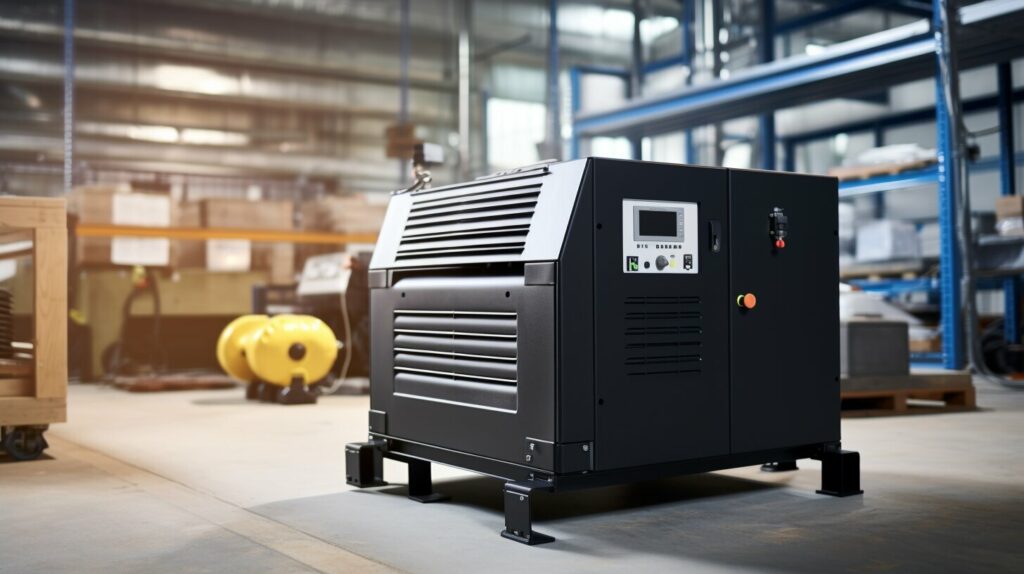
“Oil-free air compressors eliminate the risk of oil contamination, ensuring air purity and preventing damage to sensitive equipment.”
All these benefits make oil-free air compressors an attractive choice for many industries and applications. The demand for oil-free compressors is expected to increase as more companies shift towards sustainable and efficient production practices.
Oil-Free Compressor Technology: How It Works
Oil-free air compressors use a different technology than oil-lubricated compressors, allowing for operation without needing oil lubrication. Instead of relying on oil to seal the moving parts, oil-free compressors use special coatings and materials that enable the compression process without direct contact between the rotor and stator.
The technology behind oil-free compressors typically uses two stages of compression. The first stage uses a series of rotating vanes to draw in air and compress it. This compressed air is then passed through an intercooler to cool it down before it enters the second compression stage. The second stage then compresses the air even further before it is ready for use.
The use of advanced coating materials and special design features of oil-free compressors means that they operate at a much lower temperature than oil-lubricated compressors, reducing the thermal stress on the parts. This results in a longer lifespan for the compressor, less maintenance, and lower overall operating costs.
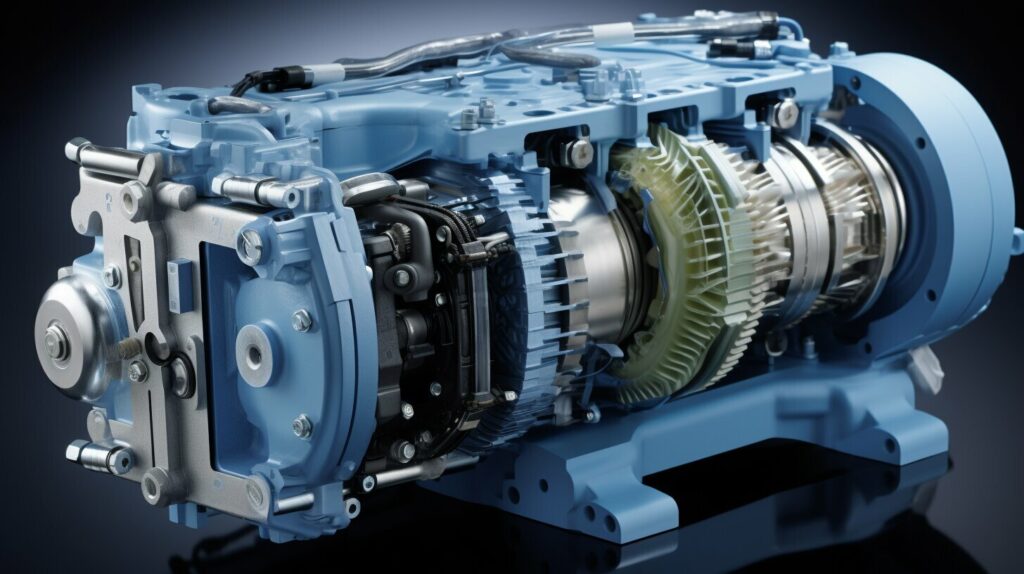
“The use of advanced coating materials and special design features of oil-free compressors means that they operate at a much lower temperature than oil-lubricated compressors, reducing the thermal stress on the parts.”
Oil-Free vs Oil-Lubricated Air Compressors: A Comparison
Regarding air compressors, the type of lubrication used can make a big difference in performance, maintenance, and air quality. Due to their many advantages, oil-free air compressors have become a popular alternative to oil-lubricated models.
Performance: Oil-free air compressors are known for providing consistent, clean air without any oil contamination. This makes them ideal for industries such as food and beverage, pharmaceuticals, and electronics manufacturing, where air purity is critical. In contrast, oil-lubricated air compressors can produce oil mist or vapor that could contaminate the compressed air and cause damage to equipment or products.
Maintenance: Oil-free air compressors are also easier to maintain than their oil-lubricated counterparts. They don’t require regular oil changes or filter replacements, which can save time and money. Oil-free compressors don’t produce oil sludge or carbon buildup that can clog the system and reduce efficiency.
Effectiveness: While oil-lubricated air compressors can be effective for certain applications, they may not be the best choice for industries with high air purity requirements. Oil-free air compressors can be more effective in these cases, as they eliminate the risk of oil contamination and ensure that the compressed air meets industry standards.
Another factor to consider is the initial cost of the compressor. Oil-free air compressors cost more upfront than oil-lubricated models due to the specialized technology and materials involved. However, the long-term savings on maintenance and repair costs can often make up for this difference.
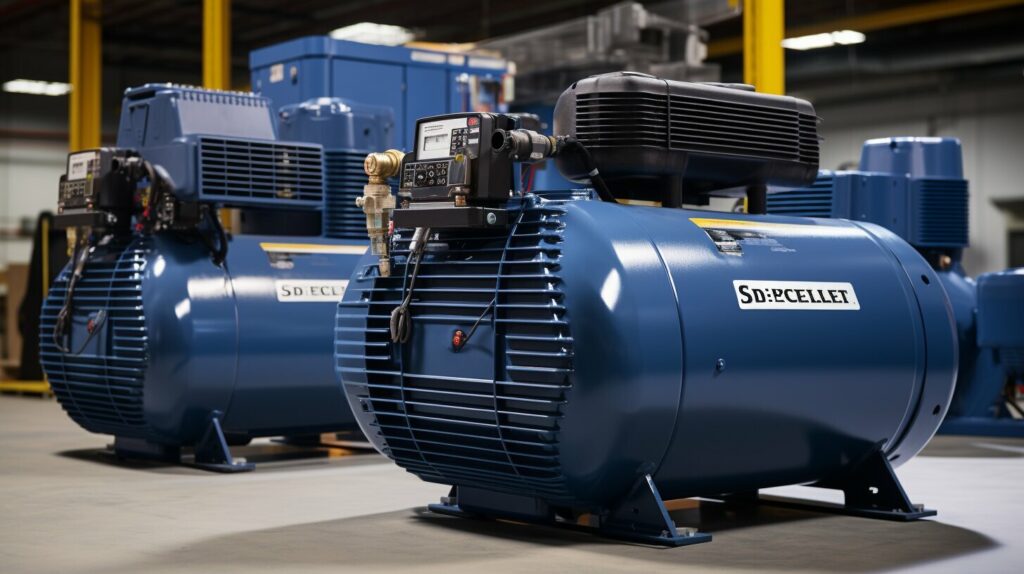
“I work in the electronics manufacturing industry and we switched to oil-free air compressors a few years ago. We’ve noticed a big improvement in the quality of our products, and maintenance is much easier now.” – John, Production Manager
In summary, while oil-lubricated air compressors can be effective for certain applications, oil-free air compressors are often the better choice for industries with high air purity requirements, such as food and beverage or pharmaceuticals. They are easier to maintain, more effective, and can provide significant long-term savings.
Applications of Oil-Free Air Compressors
Oil-free air compressors are a versatile technology used across various industries requiring clean, oil-free air. Here are some of the applications where these compressors are commonly used:
| Industry | Application |
|---|---|
| Food and Beverage | Production and packaging of food and beverages that require oil-free air to prevent contamination and ensure product quality. |
| Pharmaceuticals | Manufacturing of drugs and medicines that require a sterile environment and clean, oil-free compressed air to prevent contamination. |
| Automotive | Spray painting and finishing processes that require oil-free air to prevent damage to the finish and ensure a smooth, high-quality coat. |
| Electronics | Production of electronic components and devices that require clean, oil-free compressed air to prevent damage and ensure optimal performance. |
| Hospitals | Medical equipment that requires clean, oil-free air to prevent contamination and ensure patient safety. |
| Construction | Powering pneumatic tools and equipment that require clean, oil-free compressed air to prevent damage and ensure proper functioning. |
Oil-free air compressors also have applications in the aerospace, textile, and chemical industries.
The Efficiency of Oil-Free Air Compressors
One of the biggest advantages of oil-free air compressors is their efficiency. These compressors are designed to optimize energy consumption, reducing operational costs.
Oil-free compressors are known for their lower maintenance requirements than oil-lubricated compressors, which translates to less downtime and lower repair costs. Additionally, oil-free compressors do not require the use of oil, eliminating the need for oil changes and the associated costs. This makes oil-free air compressors an excellent choice for industries prioritizing cost-saving measures and energy efficiency.
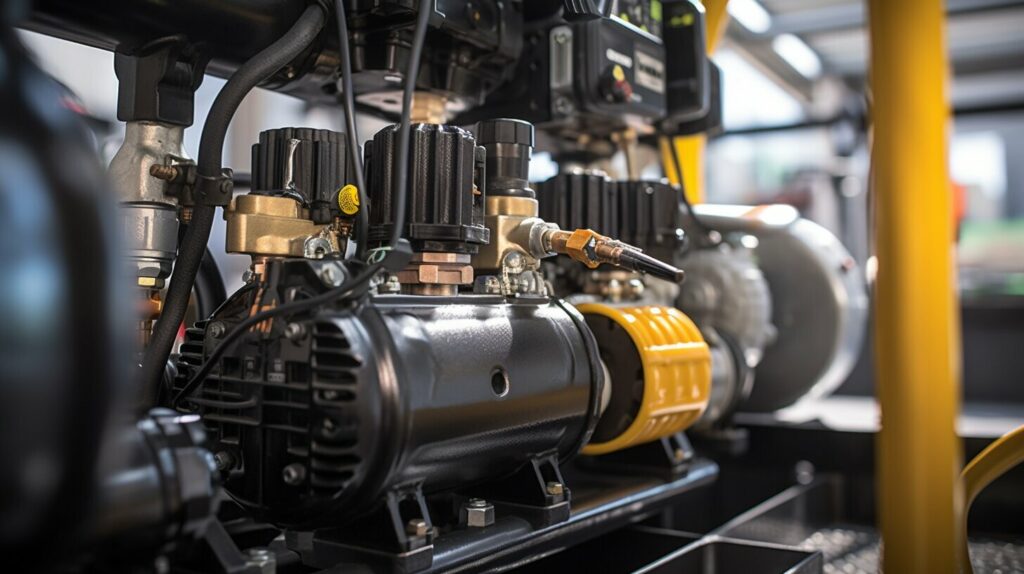
Another aspect of the efficiency of oil-free air compressors is their quiet operation. These compressors produce less noise than oil-lubricated compressors, making them an ideal choice for workplaces where noise is a concern.
Overall, the efficiency of oil-free air compressors makes them a smart investment for businesses looking to reduce costs and optimize their operations.
Maintenance Tips for Oil-Free Air Compressors
Keeping an oil-free air compressor in top condition is crucial to ensure its longevity. Regular maintenance checks contribute significantly to these compressors’ proper functioning and efficiency. Below are some maintenance tips that will help keep your oil-free air compressor running smoothly:
- Perform regular checks on valves and hoses to ensure they are free from cracks or leaks.
- Clean the compressor regularly to avoid dust buildup in the air filter.
- Ensure the compressor is filled with the appropriate oil-free lubricant.
- Check the air filter regularly and replace it if it is dirty or clogged.
- Inspect the belts and pulleys for wear and replace them if necessary.
- Check the compressor’s electrical connections and ensure they are tight and secure.
- Ensure the pressure relief valve works correctly.
- Drain the compressor’s tank regularly to remove moisture buildup.
- Follow the manufacturer’s recommended maintenance procedures and schedule.
Following these tips will ensure your oil-free air compressor lasts for a long time and operates at optimal efficiency.
Additional Tip:
If you use your oil-free air compressor frequently, performing maintenance checks every 3-6 months is advisable. However, if you use it less frequently, checks can be performed every 6-12 months.
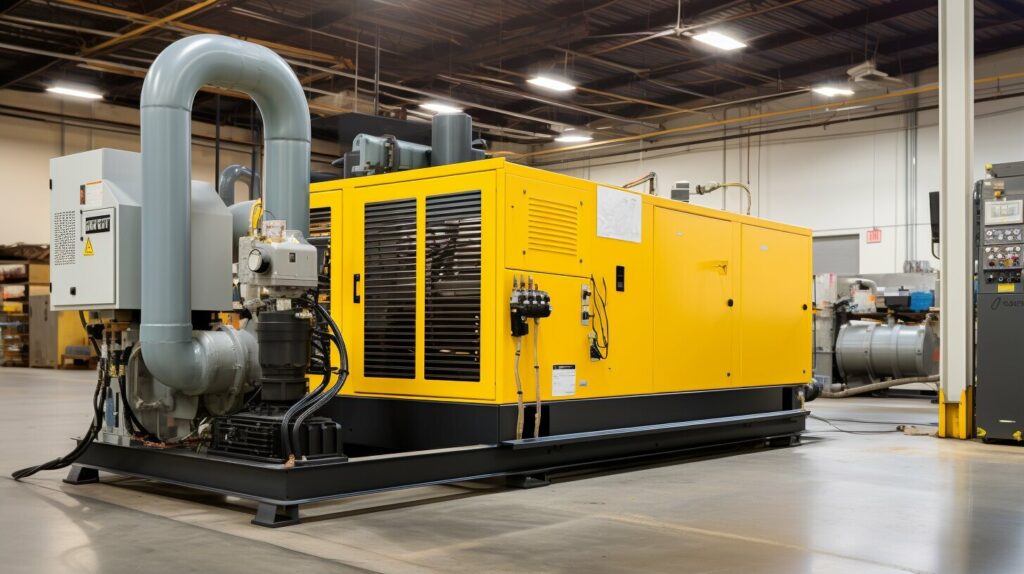
Industrial Oil-Free Air Compressors: Meeting the Demands of Heavy-duty Applications
The demand for reliable and efficient air compressors is critical in heavy-duty industries such as mining, construction, and manufacturing. Industrial oil-free air compressors have been designed to meet these demands and provide a high-performance solution for heavy-duty applications.
These compressors are built to withstand harsh environments and heavy usage, ensuring maximum uptime and productivity. They also eliminate the risk of oil contamination, making them ideal for industries where air purity is paramount.
Industrial oil-free air compressors come in various sizes and capacities, making them suitable for various applications. They produce clean, dry air, essential for pneumatic tools and machinery, and can operate continuously without needing maintenance.
Some of the most common applications of industrial oil-free air compressors include air separation, chemical processing, food and beverage production, and pharmaceutical manufacturing. They are also used in various heavy-duty applications, such as drilling, excavation, and rock breaking.

When choosing an industrial oil-free air compressor, it’s essential to consider factors such as capacity, performance, and reliability. Leading manufacturers such as Atlas Copco, Ingersoll Rand, and Sullair offer a wide range of oil-free compressors that provide excellent value and performance.
Whether in the mining or manufacturing industry, an industrial oil-free air compressor can provide the reliability, performance, and efficiency your business demands.
Top Oil-Free Air Compressor Manufacturers
Choosing the right oil-free air compressor manufacturer is essential for ensuring high-quality and reliable performance. Here, we take a look at some of the top oil-free air compressor manufacturers in the industry:
| Manufacturer | Product Range | Key Features |
|---|---|---|
| Ingersoll Rand | Rotary Screw Compressors, Scroll Compressors, Dental Compressors, and more | Reliable performance, energy efficiency, and low maintenance costs |
| Kaishan | Piston Compressors, Scroll Compressors, Rotary Screw Compressors, and more | Highly efficient, durable, and low-noise operation for industrial and commercial applications |
| Atlas Copco | Piston Compressors, Scroll Compressors, and Rotary Screw Compressors | Energy-saving technology, low noise, and multi-functionality for various industrial uses |
| Hitachi | Piston Compressors, Scroll Compressors, and Rotary Screw Compressors | User-friendly design and advanced technology to deliver high-quality, oil-free air |
| Quincy Compressor | Piston Compressors, Rotary Screw Compressors, and Oil-Free Scroll compressors | Durability and reliability for a range of applications, including food and beverage, pharmaceuticals, and electronics manufacturing |
These manufacturers are known for their quality products and have a proven track record of delivering efficient, high-performance, oil-free air compressors. When selecting a manufacturer, consider their product range, features, and reputation to make an informed decision that meets your needs.
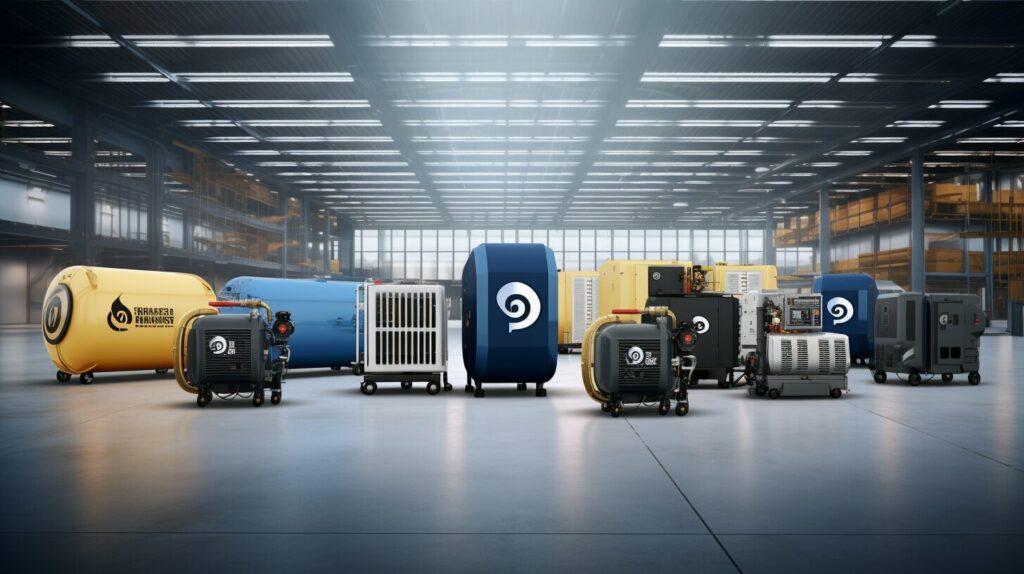
Factors to Consider When Choosing the Best Oil-Free Air Compressor
Choosing the right oil-free air compressor can be daunting, as many options are available in the market. However, to ensure that you make the right choice, you need to consider some essential factors that will impact your decision. Here are some elements you should consider.
- Performance: The first factor to consider is the compressor’s performance. You must select the right size and capacity matching your needs and workload. You should also take note of the compressor’s pressure rating, air volume, and duty cycle to ensure they can meet your industrial or home needs.
- Reliability: Choosing a reliable air compressor that can operate efficiently over a long period is essential. You should review customer feedback and ratings from reliable sources to understand the compressor’s durability, ease of maintenance, and troubleshooting capabilities.
- Cost: The cost of an air compressor can vary, depending on factors such as brand, features, and capacity. It is essential to set a budget and consider the long-term cost of ownership when making a purchase decision. To determine its true value, you must analyze the compressor’s operational expenses and energy efficiency.
- Noise Level: Noise levels can be a significant concern in some environments, such as offices or residential areas. You should consider air compressors that operate quietly to avoid causing any disturbance.
- Brand reputation: Choose an air compressor from a reliable and trustworthy brand with a reputation for quality products and good customer service. You can check online reviews and forums to learn more about the brand and its reputation within the industry.
Conclusion
Choosing the right oil-free air compressor can make all the difference in ensuring you get the best results from your operations. By evaluating your needs and considering these factors before making a purchase, you can make an informed decision and select an air compressor that meets your needs and expectations.

Oil-Free Air Compressor Reviews: Insights from Users
If you’re considering purchasing an oil-free air compressor, it’s important to hear from other users before deciding. Here are some insights from individuals who have used oil-free air compressors in various settings.
“I purchased an oil-free air compressor for my home workshop and have been extremely satisfied with its performance. It operates quietly and consistently, and I appreciate not having to deal with the mess and hassle of oil lubrication.”
-John D.
“As a small business owner in the automotive industry, I rely on the durability and efficiency of my oil-free air compressor on a daily basis. It’s been a great investment and has held up well under heavy usage.”
-Samantha W.
Overall, users have reported high satisfaction levels with their oil-free air compressors, citing benefits such as ease of maintenance, improved air quality, and cost savings in the long run.
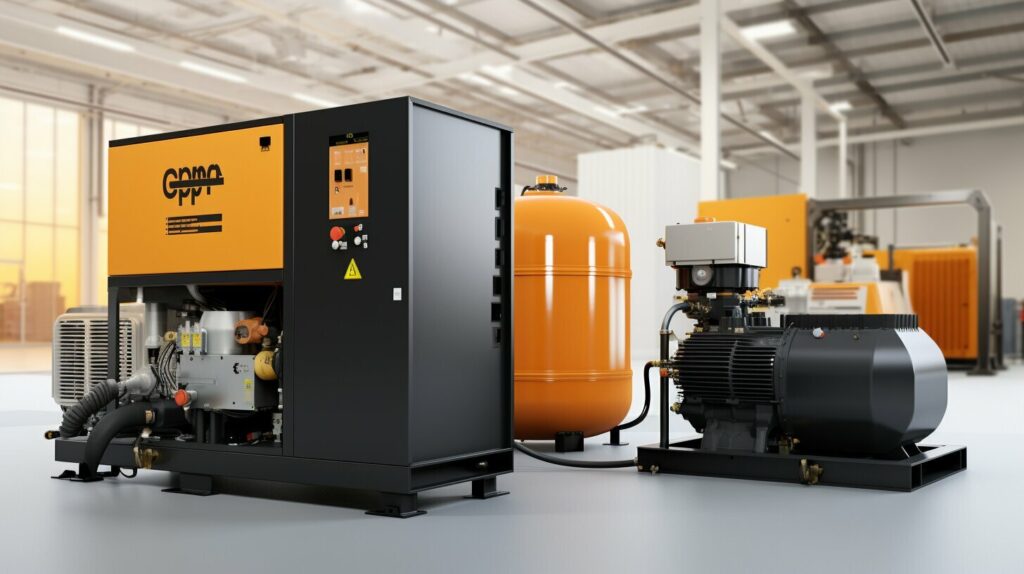
Cost Analysis of Oil-Free Air Compressors
One of the primary concerns when investing in oil-free air compressors is the cost. These compressors are generally more expensive than their oil-lubricated counterparts, but they offer significant long-term maintenance and energy efficiency savings.
First and foremost, the initial investment for an oil-free air compressor can be higher than an oil-lubricated compressor. This is due to the advanced technology and materials required to manufacture oil-free compressors. However, it is important to remember that the benefits of using an oil-free compressor far outweigh the initial costs.
One of the main advantages of oil-free compressors is that they require less maintenance than oil-lubricated compressors. Since there is no oil involved, there is no need for regular oil changes or filter replacements. This can result in significant cost savings over time, particularly for large industrial applications with multiple compressors.
Another cost-saving benefit of oil-free compressors is their energy efficiency. These compressors are designed to operate at a higher level of efficiency, which means they use less energy than oil-lubricated compressors. This lowers operational costs and results in reduced carbon emissions and a smaller environmental footprint.
Overall, the cost of using an oil-free air compressor is justified by the long-term maintenance and energy efficiency savings. It is important to consider the specific needs of your industry or application and choose an oil-free compressor that provides the necessary performance and capacity while offering reliability and cost-effectiveness.

Oil-Free Air Compressor Lifespan: Ensuring Longevity
While oil-free air compressors are designed to last long, proper maintenance is essential for longevity. Here are some tips to help you get the most out of your oil-free air compressor:
- Regularly check and replace air filters to prevent dust and debris from entering the compressor.
- Monitor the oil level, even though it is not lubricated with oil. Some models require regular oil changes or lubrication of bearings and other moving parts.
- Ensure proper ventilation and avoid exposing the compressor to extreme temperatures or moisture, which can damage the compressor and its components.
- Use the compressor according to its intended purpose and capacity to avoid overuse or overheating, leading to component failure or even irreparable damage.
By following these simple maintenance tips, you can extend the lifespan of your oil-free air compressor and get the most out of its performance and reliability.

“Proper maintenance is essential for ensuring the longevity of your oil-free air compressor.”
Oil-Free Air Compressors for Home Use: Convenience and Peace of Mind
If you’re a DIY enthusiast or enjoy tackling home improvement projects, an oil-free air compressor can be a useful addition to your toolkit. These convenient and safe compressors offer peace of mind for you and your family.
An oil-free air compressor means you don’t have to worry about harmful oil particles contaminating your workspace or lungs. They’re also relatively lightweight and portable, making them easy to move around your home or take to different locations.
One of the main benefits of using an oil-free air compressor for home use is its versatility. From inflating tires and air mattresses to powering tools like nail guns and spray guns, an oil-free air compressor can easily handle various tasks.
One popular use for these compressors is painting. With the right spray gun attachment, you can achieve a professional-looking finish on your walls, furniture, and more. And because oil-free compressors don’t emit harmful particles, they’re safe to use indoors.
Another advantage of oil-free air compressors for home use is their low maintenance requirements. Unlike oil-lubricated compressors, which require regular oil changes and filter replacements, oil-free compressors can run longer without much attention.
When shopping for an oil-free air compressor for your home, consider factors like capacity, noise level, and size. Remember that larger compressors may be more powerful but take up more space and can be noisier than smaller models.
Overall, an oil-free air compressor can be a valuable investment for any homeowner. Whether you’re a DIY enthusiast or need a reliable tool for inflating tires and other household items, these compressors offer convenience, safety, and peace of mind.

Frequently Asked Questions (FAQ) about Oil-Free Air Compressors
What is an oil-free air compressor?
An oil-free air compressor is a type of compressor that operates without using oil as a lubricant. It uses alternative materials or technologies to reduce friction and wear on its moving parts.
What are the benefits of using an oil-free air compressor?
Oil-free air compressors offer several advantages, such as clean air output, reduced environmental impact, and lower maintenance costs. Additionally, they are more energy efficient and produce less noise than oil-lubricated compressors.
What industries commonly use oil-free air compressors?
Industries that require high levels of air purity, such as food and beverage, healthcare, and electronics, often use oil-free air compressors. They are also suitable for home use in DIY projects and small-scale applications.
What is the difference between oil-free and oil-lubricated air compressors?
The main difference between the two compressors is that oil-free compressors do not use oil to lubricate their moving parts, while oil-lubricated compressors rely on oil for this purpose. Oil-free compressors offer cleaner air output and are more energy efficient, while oil-lubricated compressors require more maintenance but are suitable for heavy-duty industrial applications.
How do I maintain my oil-free air compressor?
To ensure the longevity of your oil-free air compressor, you should follow the manufacturer’s maintenance guidelines. This may include regular cleaning, checking for leaks, and changing filters. It is also important to use the compressor according to its recommended usage guidelines and to store it in a dry, clean environment.
How can I choose the best oil-free air compressor for my needs?
When selecting an oil-free air compressor, consider the required air flow rate, tank size, noise level, and energy consumption. Additionally, look for reputable brands and read reviews from other users to gauge their satisfaction with a particular model.
Are oil-free air compressors more expensive than oil-lubricated compressors?
Generally, oil-free air compressors may have a higher initial cost than oil-lubricated compressors, but they offer lower maintenance costs, reduced energy consumption, and a longer lifespan, which can result in significant savings over time.
Can I use an oil-free air compressor for painting or other applications that require oil lubrication?
No, oil-free air compressors are designed for applications that do not require oil lubrication. For applications requiring oil lubrication, be sure to use an oil-lubricated air compressor and check the manufacturer’s guidelines for the specific type of oil.
Source
Li, Y., Wu, Y., Li, Y., Yu, G., Wang, Z., & Li, L. (2018). Performance comparison of oil-free and oil-flooded screw compressors based on thermodynamic assessment. Energy, 147, 602-613. https://doi.org/10.1016/j.energy.2018.01.039 This article compares the performance of oil-free and oil-flooded screw compressors using thermodynamic analysis. It found that oil-free compressors had a lower isentropic efficiency but provided cleaner air.
Lebecq, R., Zahradnik, J., Lagrain, B., & Reavell, K. (2017). Oil-Free Reciprocating Compressors. Chemical Engineering & Technology, 40(11), 1995–2002. https://doi.org/10.1002/ceat.201700094 This review summarizes technological advances in oil-free reciprocating compressors, including special coatings, materials, and lubricants to minimize friction. It discusses applications and challenges for oil-free compressors.
Liu, X., Zhou, Y., & Ouyang, W. (2019). Leakage flow characteristics of dry gas seal in oil-free turbo compressor. Proceedings of the Institution of Mechanical Engineers, Part E: Journal of Process Mechanical Engineering. https://doi.org/10.1177/0954408919857616 This paper analyzes leakage flow in dry gas seals used in oil-free turbo compressors using computational fluid dynamics (CFD) modeling. It provides insight into seal design to minimize leakage.

